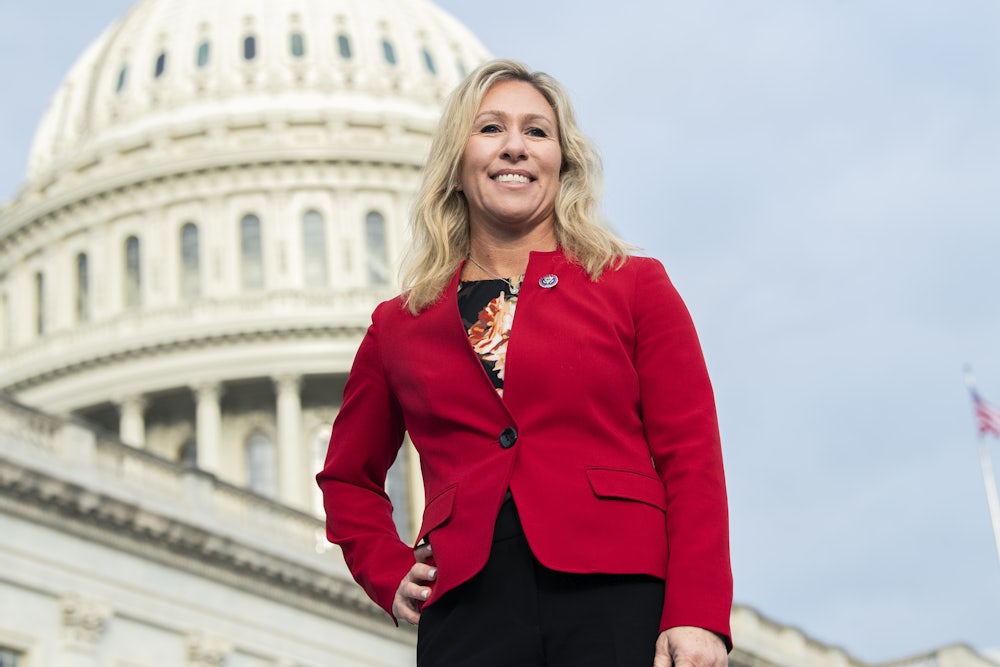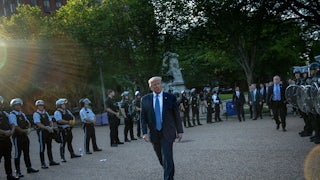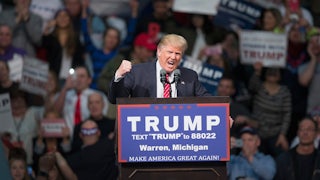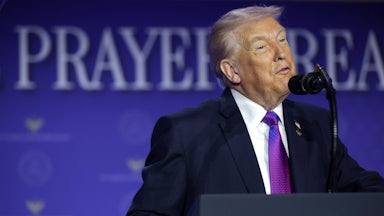One persistent reality for House Minority Leader Kevin McCarthy, whether he becomes speaker of the House of Representatives or not, is that Congresswoman Marjorie Taylor Greene will be an ongoing blight on the Republican caucus and the GOP overall. Just in Greene’s first term, she’s lost her committee assignments over her history of indulging in racist and antisemitic conspiracy theories. McCarthy has had to publicly condemn the Georgia congresswoman for speaking at a white nationalist gathering in Florida. He’s also had to meet with her privately for over an hour in response to bipartisan furor about Greene’s interest in unfounded conspiracy theories and her habit of indulging in racist and sometimes violent tropes.
There’s no sign that dynamic will change in the next few years. Greene is still the favorite to win reelection, despite some momentum in favor of her challenger in the Republican primary, health care executive Jennifer Strahan. Greene has also continued to stay in the limelight as a prime example of embarrassing intraparty fighting: A new Politico report last Friday described how a fight between Greene and fellow QAnon conspiracist turned Congresswoman Lauren Boebert almost came to blows.
None of this is something a caucus leader and aspiring speaker wants to deal with. But McCarthy had his chance to hinder Greene’s ascension to Congress, and the California Republican opted against doing anything for fear of Donald Trump. According to New York Times reporters Jonathan Martin and Alexander Burns in their upcoming book, This Will Not Pass: Trump, Biden, and the Battle for America’s Future, a copy of which I obtained last week (its official release date is Tuesday), when the then-candidate Greene was in a runoff election against John Cowan, a more establishment conservative, aides for the National Republican Congressional Committee were alarmed by the possibility that Greene could be elected to Congress. Greene’s history of associating with the far-right QAnon-conspiracy-theory community was well known, and her past antisemitic comments and “grotesquely racist” behavior had begun to surface in the national media.
So NRCC officials gathered to discuss possibly staging some kind of “intervention,” Martin and Burns write. A move like this is in itself notable. Campaign committees are supposed to be neutral in party primaries. In practice that isn’t always the case, and there have been cycles where, say, Democrats’ Senate campaign arm endorsed in a primary, sparking backlash from the rest of the field. But it’s still rare and illustrates the early internal alarm some Republicans felt about Greene entering their ranks.
It’s not clear from the book how the NRCC would have intervened. Martin and Burns write that the NRCC aides knew it would be a long shot if they did anything at all. In the end it didn’t matter. McCarthy killed the idea. He told the campaign officials that the message he got back from the White House was to stand down. Then-President Trump didn’t want Republicans to stop Greene from becoming a member of Congress. The president knew that she was a “paranoid extremist,” Martin and Burns write, but he was willing to let that slide since she loved Trump and was on course to win. McCarthy, always concerned about keeping his relationship with Trump good, didn’t want to piss off the president.
The episode in This Will Not Pass is indicative of the characters of both McCarthy and Greene. McCarthy has a history of deferring to Trump. Initially, after the January 6, 2021, mob attack on the Capitol, the Republican leader said Trump did in fact bear “some responsibility” for inciting the riot. In private comments to fellow members of Congress shortly after the mob attack, McCarthy said that he thought Trump should resign and that he would recommend that to him. He also suggested that some Republican members of Congress (likely of the same conservative bent as Greene) should be booted from Twitter. But a little more than two weeks after that, McCarthy traveled to Mar-a-Lago to pay deference to Trump.
Greene, meanwhile, would go on to win the runoff, suggest that Trump impose martial law to retain power, blame Jewish people for wildfires in California (which helped earn a wide-ranging rebuke from Senate Minority Leader Mitch McConnell), spread misinformation about Covid-19, get permanently suspended from Twitter, and falsely claim that Democrats have been funding Nazis in Ukraine—a claim that spurred a stinging rebuke from Congressman Jamie Raskin last week.
“She said that the aid that the taxpayers of America are sending the people of Ukraine to defend themselves against Vladimir Putin and the Russian army falls in the hands of Nazis. I want to see her proof. Where’s her evidence?” Raskin said. He went on to say, “She talks about NATO Nazis. [Does] the minority believe that our allies in NATO who are trying to defend the people of Ukraine are Nazis? Has it come to this? The gentlelady talks about a massive invasion, we had a massive invasion of our own chamber and she continued to be a cheerleader for the insurrection and denied what happened here.”
As long as Greene is in Congress, McCarthy will have to face questions on whether her views represent the rest of the Republican Party’s. Democrats will work to paint every Republican as aligned with Greene. In terms of McCarthy’s own ambitions, Greene is another member of the House Freedom Caucus, that small bloc of unruly ultraconservative insurgents who are more than happy to buck Republican leadership anywhere and everywhere. McCarthy has tried to tame Greene preemptively for whenever Republicans retake control of Congress. He’s said he would restore her committee assignments as speaker. Even then, it’s unlikely Greene would change her behavior at all. McCarthy, on the other hand, seems pretty intent on changing his behavior in whatever way he can as long as it does two things: keeps Trump happy and keeps himself at the head of Republican House leadership. Recent history suggests that’s really all that McCarthy cares about.






